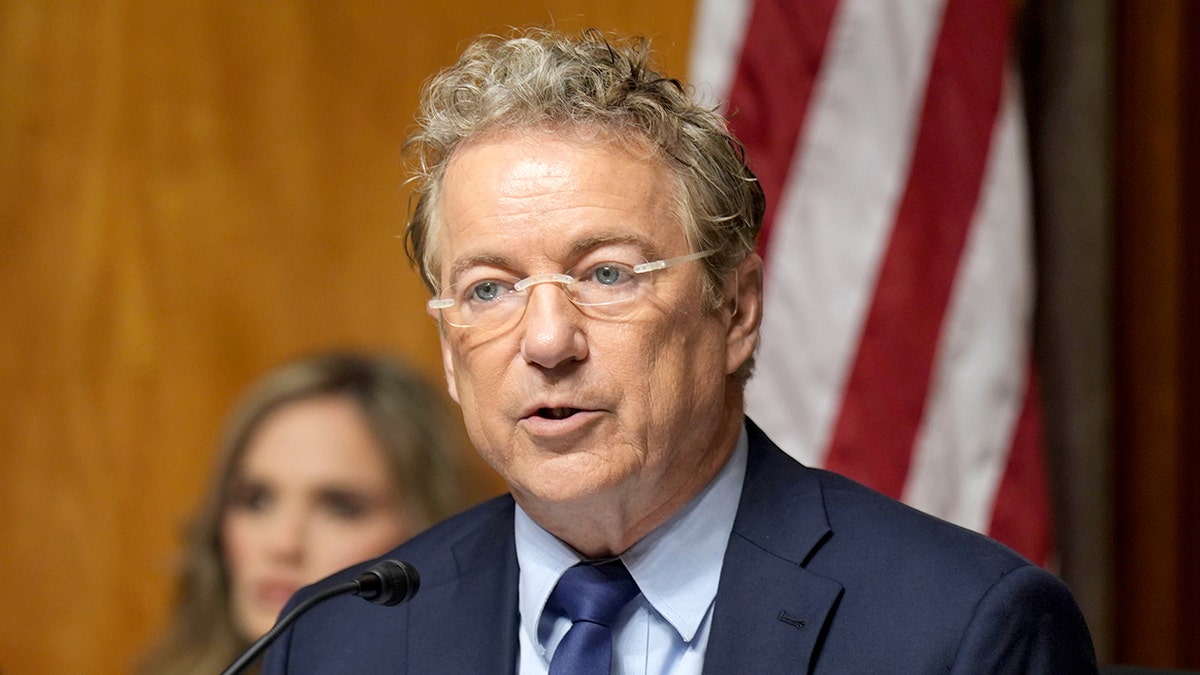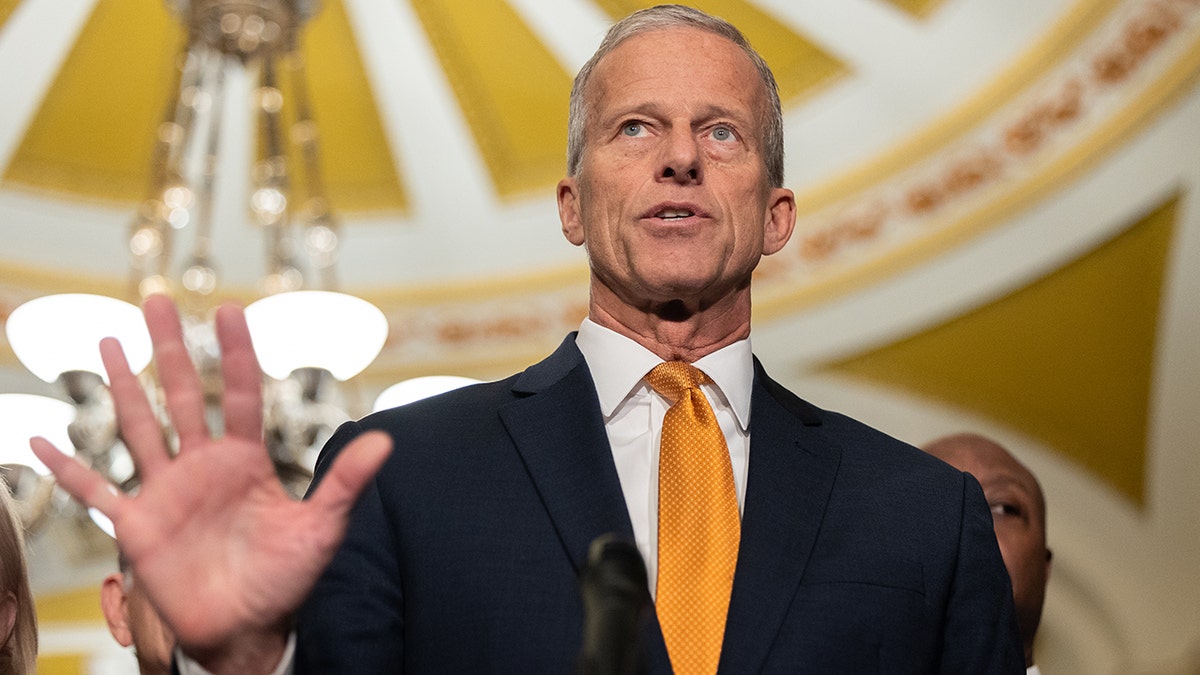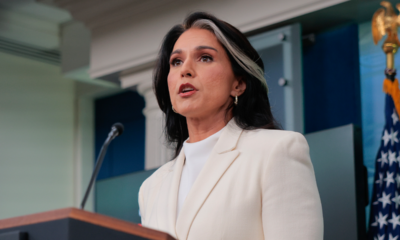INTERNACIONAL
The Speaker’s Lobby: Happy New Year as shutdown showdown draws to a close

NEWYou can now listen to Fox News articles!
The Senate did not drag out final passage of the interim spending bill to end the government shutdown.
Oh, you may think that happened. Especially after the Senate broke a filibuster on the bill just before 11 p.m. ET Sunday night. So why didn’t the Senate just go immediately to final passage? After all, the plan had to go to the House. Flight delays were piling up. Federal workers were at the end of their rope, going without paychecks. SNAP benefits were in limbo. So why not just step it up?
Well, it’s more complicated than that. And believe it or not, the Senate kind of did step it up.
At least from the Senate’s perspective.
REPORTER’S NOTEBOOK: PAUL STANDS FIRM AGAINST SPENDING BILL AS SHUTDOWN CLOCK TICKS
The Senate ultimately did not drag out passage of the interim spending bill aimed at ending the government shutdown. (J. Scott Applewhite/AP)
There were several Senate factions not ready to vote right away to end the shutdown last Sunday. It was clear the Senate would eventually pass the bill to fund the government. That’s to say nothing of the worsening impacts of the shutdown on a nearly hourly basis.
Sen. Rand Paul, R-Ky., was the only Republican who broke with his party and voted no on the test vote to break a filibuster on the deal to re-open the government. Paul voted nay because he wanted a change in the bill regarding hemp.
The measure prevents «unregulated sales» of «intoxicating hemp-based» products at gas stations and small retailers. It preserves the sale of non-intoxicating CBD in other hemp-related products.
So, if the Senate got 60 votes Sunday night to break the filibuster and only needs 51 to pass the bill, why was the Senate stymied by Paul or even others?
Sen. Markwayne Mullin, R-Okla., told reporters there was a senator asking for a vote on an amendment that would hold members’ pay in escrow during future government shutdowns. This would be in addition to Paul, asking for a vote on an amendment related to hemp policy.
Paul’s request was previously known. But this additional ask underscores the precarious balance of any unanimous consent agreement in the Senate. Once one senator gets something, others are likely to ask for something for themselves.
Paul told reporters that he believed leadership was happy to give him his vote. But Paul said Sen. John Kennedy, R-La., blocked that for a short period.
Meanwhile, Mullin said Democrats went «radio silent» on whether they were willing to yield back debate time to speed up consideration of the bill. Any one senator could drag this process out for days, so their cooperation would be crucial in bringing the shutdown to a quick end.
It’s about speed.
Buckle down for this next part. It gets complicated.
SENATE DEMOCRATS, REPUBLICANS REACH DEAL TO REOPEN GOVERNMENT
The vote on Sunday night was on breaking a filibuster to proceed to the original House-passed spending measure from September. That needed 60 yeas.
Therefore, the Senate had just broken a filibuster to begin work on the bill. That’s all.
By rule, the Senate can run out 30 hours of debate after breaking the filibuster, unless Paul relents. That would have gotten us to a minor procedural vote to actually get on the bill by dawn last Tuesday morning.
That is, unless there was an agreement with Paul – or for that matter – other Democratic senators to expedite things.
But wait. There’s more.

Gripes by Sen. Rand Paul, R-Ky., over hemp provisions threatened to stymie shutdown progress. (Al Drago/Bloomberg via Getty Images)
The intention of Senate Majority Leader John Thune, R-S.D., – and this was done with a wink and a nod to secure an agreement on Sunday – was for him to file what’s called a «substitute» amendment. A substitute simply removes the House’s old bill text and replaces it with the new spending package.
But because this is a substitute amendment, Thune must then «file cloture» to break a filibuster on that. By rule, Thune could not do that until this past Tuesday. Cloture petitions require an intervening day before ripening. So that means the Senate could not vote to break a filibuster on the substitute (e.g. the new bill) until last Thursday. Again, that needs 60 yeas. And if there was no deal, the Senate could bleed out another clock before voting yes or no on the substitute. Presumably, that would have been on Friday.
But we’re not done yet.
TRUMP ENDS SHUTDOWN, FACES BACKLASH AND MAKES SURPRISE EPSTEIN MOVE AMID CHAOTIC WEEK
If the Senate would have adopted the new text on Friday, then Thune would have had to file cloture again on the underlying bill, wait a day (Saturday) and then have a vote to break a filibuster on that (again needing 60) on Sunday.
This scenario meant that the Senate would finally pass the newly revamped spending bill on Monday. And it would mean that the House would not have tackled the bill until this coming Tuesday or Wednesday.
So that really would have stretched out the government shutdown.

It was in the interest of Senate Majority Leader John Thune, R-S.D., to secure a deal with Paul in a bid to accelerate things. (Nathan Posner/Anadolu via Getty Images)
That said, this was probably never going to happen. That’s just doing things by the book.
But it’s also why it was in the interest of Thune to get a deal with Paul to accelerate things. Otherwise, Paul or the Democrats who oppose the bill could have slowed things down and extended the shutdown.
But consider for a moment that if the left really wanted Democrats to stand and fight, there’s a group of core Democrats who are upset that their party relented. But then again, they had an opportunity to stretch out the shutdown and opted not to do so. There was also a smattering of Democrats who were more than happy to have others vote to open the government – even though they wanted to do so but weren’t willing to vote yes. They relied on the yes votes – or courage – of their colleagues.
And Paul was upset at the hemp provision.
«It’s really contemptuous,» said Paul of the hemp issue. «I’m not looking to hold things up. I’m looking to try to get things done.»
Paul said his «goal is to condense the time.» He got just that – a vote to strip out the hemp provision. But senators blocked it. And without significant Democratic protestations, the Senate approved the bill on Monday without deep delays.
CLICK HERE TO DOWNLOAD THE FOX NEWS APP
So they didn’t really drag things out. Truth be told, most lawmakers were done with the shutdown and wanted to end it quickly – regardless of their politics.
But they’ll have another opportunity when the next round of funding expires on Jan. 30.
congress,senate,government shutdown,rand paul
INTERNACIONAL
Del conurbano a casi morir en Ucrania: la increíble historia de uno de los argentinos que combate en la guerra con Rusia

Julián Nieto tiene 30 años, es de Merlo y hasta hace poco su vida transcurría lejos del frente de batalla: trabajaba en una fábrica de muebles y en el acondicionamiento de sucursales para grandes empresas multinacionales. Hoy, su nombre se sumó a la lista de argentinos que viajaron como voluntarios a Ucrania para combatir en la guerra contra Rusia, la historia que cuenta Morir en guerra ajena, el documental de TN.
A los pocos días de haber llegado, un ataque con drones cambió su historia para siempre: perdió un ojo, estuvo a punto de perder una pierna y sobrevivió de milagro.
Nieto tenía experiencia militar previa. Había sido soldado del Ejército Argentino y, según él mismo relata, su decisión de ir a una guerra no fue algo largamente planeado. “¿Si había pensado antes alguna vez en ir a una guerra? No, es la primera vez que me lo planteé en serio y pelear por otro país que no es el tuyo”, explicó a TN.
Leé también: Morir en guerra ajena: la historia de los argentinos que combaten en Ucrania
En ese punto, su motivación aparece atravesada por una idea que repite a lo largo de su testimonio: “Yo soy un defensor de la libertad y cada uno defiende la libertad desde donde puede, pero a veces no de donde quiere. Yo tengo la oportunidad de hacerlo ahora desde donde quiero y desde donde puedo”.
Antes de viajar, su vida estaba anclada en el conurbano bonaerense. “No tengo hijos, no tengo mujer, tengo a mi mamá y mis cuatro hermanos”, contó. Sobre el impacto de su decisión en su familia, fue directo: “Yo sé que mi mamá siente dolor, tristeza, porque creo que ella sabe que yo no voy mentalizado en volver”. Merlo perdió un ojo durante el ataque. (Foto: TN)
El ataque que casi lo mata ocurrió apenas días después de su arribo al frente. Nieto lo reconstruye con precisión. “De pronto estábamos hablando, esperando, formando. Uno de los comandantes recibe una alerta por radio. No entiendo su idioma, pero lo único que dijo fue ‘drone, dron’”, recordó. Como líder de grupo, dudó en ponerse a salvo primero. “Quedaba mal que yo saliera corriendo primero. Saqué a todos los muchachos del árbol, a uno lo manoteé, lo revolé, le dije que corra. No sé quién era”.
Cuando todos comenzaron a huir, él también lo hizo, pero no llegó lejos. “No llegué a ser más de 10 metros corriendo. Cuando vi que el impacto era inminente, me tiré al suelo. Caí con todos los protocolos, con la boca abierta para no reventarme los tímpanos”. La explosión fue inmediata. “Siento la explosión y no siento nada en el cuerpo”, relató. Segundos después, al incorporarse, se dio cuenta de la gravedad de las heridas: “Cuando abro los ojos no veía de uno y empiezo a gotear sangre en las manos. Ahí sí empecé a sentir el dolor”.
Leé también: El dramático relato de un argentino que combate para Ucrania y sobrevivió a un poderoso ataque ruso con drones
El fuego y la metralla hicieron el resto. “Creí que me estaba prendiendo fuego porque sentí un ardor en todo el cuerpo, sobre todo en la pierna. Me doy vuelta y tenía la pierna que me estaba saliendo muchísima sangre”. Intentó ponerse de pie, pero cayó nuevamente. “En ese momento que caigo, una explosión más”. Logró arrastrarse hasta que apareció uno de sus hermanos, que también combate allí. “Me arrastro boca arriba y me encuentra mi hermano”, contó. La asistencia de sus hermanos y compañeros fue clave para salvarle la vida.
El ataque dejó un saldo devastador. “Básicamente el ataque hubo muchísimos muertos, lamentablemente, además de los heridos”, dijo. También tuvo un impacto psicológico en el resto de la tropa. “La otra consecuencia fue que muchos soldados se dieron cuenta que no estaban preparados para este tipo de guerra. Muchos pidieron irse”. En su caso, el golpe no quebró su decisión. “A mí en lo personal no me afectó y el hecho de haber perdido un ojo tampoco. Yo todavía estoy con la moral muy alta y espero la hora de recuperarme”, aseguró.
Leé también: En la Rusia de Putin, hacer chistes sobre la guerra en Ucrania o sobre religión te puede llevar a la cárcel
La historia de Nieto se conoce en un contexto marcado por nuevas muertes de argentinos en el frente ucraniano. En las últimas horas se confirmó el fallecimiento de Cristian Airala, un misionero de 27 años que combatía como voluntario en una unidad de asalto del ejército de Ucrania y murió durante un ataque ruso con drones y misiles en la región de Járkiv. En el mismo episodio también murieron dos combatientes colombianos.
Airala, conocido por la chapa de guerra “Machete”, tenía formación previa en el Ejército Argentino y se desempeñaba como instructor de tiro. Su muerte se suma a una lista creciente de argentinos que perdieron la vida desde el inicio de la invasión rusa a gran escala, hace más de tres años y medio, ya que los voluntarios extranjeros suelen ser destinados a unidades de asalto, las más expuestas del frente. No existen cifras oficiales, pero distintos episodios confirmados en los últimos meses dan cuenta de la magnitud del fenómeno.
Guerra Rusia Ucrania, Rusia, Ucrania
INTERNACIONAL
North Korea executed teens for listening to K-pop, watching ‘Squid Game’: report

NEWYou can now listen to Fox News articles!
North Korean authorities executed teenagers for watching the South Korean television series «Squid Game» and listening to K-pop, human rights researchers announced in early February.
Amnesty International cited testimony from an escapee with family ties in Yanggang Province who said people, including schoolchildren, were executed for specifically watching the popular survival drama series.
It also separately documented accounts of forced labor sentences and public humiliation for consuming South Korean media elsewhere in the country, particularly for those without money or political connections.
«Usually when high school students are caught, if their family has money, they just get warnings,» said Kim Joonsik, 28, who was caught watching South Korean dramas three times before leaving the country in 2019.
WATCHDOG HIGHLIGHTS NATIONS WHERE CHRISTIANS FACE PERSECUTION AROUND THE GLOBE
A leaflet containing a U.S. dollar bill beneath USB drives loaded with K-pop music is seen during an interview with North Korean defector Park Sang-hak in Seoul, South Korea, on June 25, 2024. (Anthony Wallace/AFP via Getty Images)
«I didn’t receive legal punishment because we had connections,» he told Amnesty International in an interview.
NORTH KOREA MISSILE LAUNCH THAT PUT SOUTH KOREA, JAPAN ON HIGH ALERT ENDS IN FAILURE
Joonsik said three of his sisters’ high school friends were given multi-year labor camp sentences in the late 2010s after being caught watching South Korean dramas, a punishment he said reflected their families’ inability to pay bribes.
«The authorities criminalize access to information in violation of international law, then allow officials to profit off those fearing punishment. This is repression layered with corruption, and it most devastates those without wealth or connections,» said Sarah Brooks, Amnesty International’s deputy regional director.

Members of the North Korean Military Choir sing a Russian song during a concert following Russian–North Korean talks in Pyongyang, North Korea, on June 19, 2024. (Contributor/Getty Images)
RUSSIA’S TURN TO NORTH KOREA FOR MUCH-NEEDED AMMO A ‘LAST RESORT’ IN UKRAINE CONFLICT: ‘HITTING THE DREGS’
«This government’s fear of information has effectively placed the entire population in an ideological cage, suffocating their access to the views and thoughts of other human beings,» she added. «People who strive to learn more about the world outside North Korea, or seek simple entertainment from overseas, face the harshest of punishments.»

Fans of Korean pop music attend the KCON convention in Newark, New Jersey, on June 23, 2018. (Stephanie Keith/Getty Images)
CLICK HERE TO DOWNLOAD THE FOX NEWS APP
Several defectors told the human rights organization that they were required to witness public executions while still in school, describing the practice as a form of state-mandated indoctrination designed to deter exposure to foreign culture.
«When we were 16, 17, in middle school, they took us to executions and showed us everything,» said Kim Eunju, 40. «People were executed for watching or distributing South Korean media. It’s ideological education: if you watch, this happens to you too.»
north korea,human rights,world
INTERNACIONAL
Las memorias feroces y sin épica de la danesa Tove Ditlevsen: miseria, desenfreno, literatura y adicciones

Advertencia al lector: lo que sigue es un artículo escrito bajo el influjo de una lectura inesperada y deslumbrante. Cada tanto sucede que cuesta salir de un libro aunque hayamos llegado al final. Hay algo en los personajes que nos acompañaron, en la propia escritura o en los hechos que se narran que no terminan de irse de nuestro lado. Cada tanto sucede que es todo eso junto –los personajes, la escritura, los hechos–, que no nos abandona ni nos permite leer otra cosa. Precisamente ahí estoy, a la espera de que se apague el calor de la lectura para poder ingresar a otro universo. Es desde ese pasaje, y todavía conmovida, que escribo lo que sigue.
Tove Ditlevsen (19917-1976) era una criatura cuando supo que lo único que le interesaba en la vida era la literatura. Quería leer y quería escribir pero para eso necesitaba espacio y silencio y en el miserable departamento en el que vivía no había nunca ni silencio ni espacio. Durante sus primeros años durmió con sus padres, en la misma habitación. Solo escapaba de la opresión por las noches, cuando se sentaba en el alféizar y miraba por la ventana hacia el cielo, por encima las calles mugrientas de Vesterbro, la zona roja de Copenhague. Cuando su hermano cumplió los 18 y huyó de casa, ella pasó a ocupar el sofá de la sala a la hora de dormir: perdió la ventana pero ganó intimidad algunas horas. Entonces comenzó a registrar por escrito lo que ocurría a su alrededor y también lo que le pasaba a ella misma, una mujer extremadamente sensible, adelantada a su tiempo y con ambiciones definitivamente por fuera de su clase.
El drama fue siempre parte de su historia y también de su escritura. Su primer poema narraba en verso el duelo de una mujer por la muerte de su hijito. Cuando murió, o mejor, cuando eligió morir, tenía 58 años y era una celebridad en Dinamarca, con treinta libros publicados entre poemarios, novelas, cuentos, memorias y relatos infantiles. Además, había escrito columnas en periódicos, por lo que todos en su país la conocían, sobre todo las mujeres.
Durante décadas Ditlevsen fue una escritora clave para generaciones de lectoras danesas pero su centralidad no atenuaba la incomodidad que provocaba su literatura. El canon de la época no estaba en condiciones de procesar una obra producida a partir de la vida doméstica, el matrimonio, la maternidad, la dependencia emocional y química y el deseo de escribir como tabla de salvación, todos temas considerados menores. Era, claro, una época que no podía procesar una literatura escrita por la mayoría de las mujeres.

Tove Irma Margit Ditlevsen nació en Copenhague en 1917 y se suicidó en 1976. Aunque practicó todos los géneros (incluso los textos a pedido para ser leídos en eventos y ocasiones especiales, habilidad que explotaron todos sus superiores en los trabajos precarios que emprendió para sobrevivir), son sus memorias las que, a partir de la traducción al inglés y luego al español en los últimos años, le dieron a su nombre trascendencia en todo el mundo. Esas memorias fueron pensadas como tres libros diferentes, Infancia, Juventud y Dependencia, que fueron publicados entre 1967 y 1971.
Décadas después, hubo un editor que advirtió que los textos componían un relato único: la historia de una niña criada en la pobreza y con una madre fría y calculadora; la de una joven que se niega a cumplir el destino miserable que se avizora y quiere escribir pese a que “las chicas no escriben poesía”, como le repite su padre, un fogonero socialista; y la de una mujer adulta atrapada en matrimonios complicados, una maternidad asfixiante y, sobre todo, adicciones peligrosas que la borran del mundo cada vez por más tiempo. Fue ese editor visionario el que decidió reunir en inglés las memorias en un solo libro, el audaz y apabullante Trilogía de Copenhague (publicado en español por Seix Barral).

En Infancia Ditlevsen construye una de las figuras maternas más perturbadoras de la literatura autobiográfica del siglo XX: una mujer desangelada, irritable y violenta que desaprueba todo. “El mundo era frío y peligroso porque la ira oscura de mi madre siempre terminaba en una bofetada”, escribe Ditlevsen. La casa es una cárcel, la lectura aparece como sorpresa y la escritura es una forma de escape, una salida secreta del tormento. La realidad que se avecina para Tove no es una promesa de felicidad y por eso las palabras por escrito actúan como desahogo.
En Juventud la narradora cuenta el pasaje a la adultez con cierto desapego y sin épica: trabajos de oficina poco estimulantes, el mismo abrigo y las medias corridas, habitaciones alquiladas (la ocupación nazi aparece en algunas escenas importantes pero siempre la crisis de la protagonista está en el centro), vínculos frágiles, la sensación persistente de no encajar. Muy alta y muy delgada, algo excéntrica, siempre aparece la idea de que no es atractiva. Esto le dicen en su casa y también las amistades ocasionales del barrio. Crecer pensando que no vas a gustarle a nadie no parece un buen comienzo para una vida esplendorosa.
La prosa de Ditlevsen es seca, sin afeites, algo distante (en algún sentido, hay algo de este estilo que se encuentra en la obra de la húngara Agota Kristof). No hay belleza ni en el retrato del ascenso social, al que llega como escritora exitosa y a través de su primer matrimonio, ni en las relaciones amorosas que se sucederán, algunas más sexuales que otras. Si hay algo que insiste en el libro es la ambición literaria siempre en tensión con su inseguridad. También es una constante la dependencia de los hombres que son quienes validan o impiden que se concrete su deseo de escribir. La escritura es una necesidad vital que siempre se ve amenazada por algo o por alguien.

“Para mí, escribir es como en mi infancia, algo secreto y prohibido, vergonzoso, algo que uno se esconde en un rincón para hacer cuando nadie más está mirando”.
Su primer marido es Viggo F., el editor de la revista que publica su primer poema, cuando ella tiene 22 años. El hombre es mucho mayor y solitario, tiene dinero, ama a los artistas, viste de verde y vive en una casa en la que todo es verde como su ropa, desde las paredes hasta las copas.
“Todo en la sala de estar es verde: la alfombra, las paredes, las cortinas… y siempre estoy dentro, como en un cuadro.”
Pero lo que más la sorprende y excita a Tove cuando conoce esa casa es que en el baño de Viggo F. hay una ducha. Tímidamente, casi en un beboteo, le pide permiso para usarla.
Viggo sabe que ella es joven y la induce a vincularse con otros autores de su edad, lo que le abre a Tove la puerta a nuevas amistades y posibles relaciones amorosas. Ebbe será su segundo marido, un hombre joven y hermoso, atrapado por la familia y por su imposibilidad para resolver su futuro. Estudia economía pero ama la literatura. Y fundamentalmente no puede abandonar el alcohol. Con Ebbe llegarán el amor real, la primera hija de Tove y el esfuerzo por adaptarse a una vida tradicional en una Dinamarca ocupada por los nazis. La maternidad y los primeros cuidados de la bebé le roban a Tove el deseo sexual y Ebbe comienza a sentirse abandonado. El centro romántico de las memorias están en esta relación de pareja, que no tendrá un final feliz aunque ambos mantendrán un hilo amoroso invisible hasta el final.
“Algo ha salido mal para cada uno de nosotros, y creo que nuestra juventud ha desaparecido junto con la ocupación”.

El tercer volumen, Dependencia, es el libro el que terminó de consolidar su prestigio internacional en estos últimos años y es, si se me permite, desesperante por lo que narra y por cómo lo hace. Ditlevsen narra 25 años de su vida aunque se detiene largo rato en su matrimonio con Carl (su tercer esposo), un médico con antecedentes de enfermedad psiquiátrica que la inicia en el uso de opioides y la conduce al descenso progresivo a la adicción al Demerol.
Con él tendrá otro hijo y también se hará cargo de un hijo que el hombre tuvo con otra mujer. También casada con él y completamente dependiente de las drogas se someterá a una cirugía de oído para poder seguir inyectándose. No estaba realmente enferma, era la excusa para seguir drogándose y él, en su delirio, alimentaba esa supuesta enfermedad. Nunca recuperará la audición de ese oído. Tove se hunde, deja de escribir, olvida su cuidado personal, ya no sale de su habitación y es la niñera la que queda a cargo de los chicos. Tove ya no reconoce las unidades de tiempo: “Una hora podría ser un año, y un año podría ser una hora. Todo depende de cuánto haya en la jeringa”.
Fríamente hablando, en su vida habrá cuatro matrimonios, cuatro divorcios, tres hijos y dos abortos. Sí, Tove Ditlevsen escribía literatura sobre partos, abortos y también sobre los efectos de la menopausia (cuando habla de su madre y de su tía), temas que, siempre supimos, resultan menores y poco sugerentes para los diseñadores de cánones.
“Me enamoré de un líquido transparente en una jeringa”, escribe cuando cuenta que, en realidad, abandonó a su anterior marido por la droga y no por otro amor. El título original del libro en danés significa a la vez “casada” y “veneno”, una ambigüedad que condensa el eje de esta historia. A propósito de la primera experiencia de la narradora con el Demerol, en la New York Review of Books Deborah Eisenberg escribió: “Ninguna película de terror que haya visto —por potentes que sean sus imágenes o metáforas— se ha acercado al resto del libro en cuanto a puro terror”.
El manipulador Carl pelea con sus fantasmas y también con la necesidad de controlar a su mujer: la droga, en inyecciones o como pastillas de metadona, se convierte en la herramienta para sedar las ambiciones de independencia de Tove y mantenerla en casa. En Los Angeles Review of Books, la crítica Nina Renata Aron destacó el tratamiento del tema en este libro como un gesto de vanguardia ya que estamos acostumbrados a leer estas vidas dependientes en relatos escritos por hombres, no por mujeres. Haber dedicado un fragmento tan extenso de sus memorias a la adicción fue “un acto radical para una mujer, en cualquier lugar del mundo, en 1971”, escribió Aron.

Ditlevsen no habla desde el arrepentimiento ni se posiciona como víctima. Tampoco busca romantizar la caída y si bien el final de Dependencia la muestra casi recuperada y con su nuevo marido, no hay final feliz, no puede haberlo. Victor es editor de un diario, un hombre que la admiraba como escritora, un hombre enamorado que asume el cuidado de su mujer; el que la persuade para irse a vivir fuera de la ciudad y el que habla uno por uno con todos los médicos del pueblo para que no le receten opioides a Tove, acostumbrada a manipular a los profesionales y a falsificar recetas. Consigue distanciarla de la droga y viven juntos más de dos décadas: casi una vida normal, pero también ese matrimonio terminará en divorcio.
En la vida real, y no en sus memorias, la pareja tuvo una relación turbulenta, desquiciada. Luego de divorciarse y ser la comidilla del ambiente literario, alejada de todo pudor la escritora publicó un anuncio anónimo, aunque reconocible, en el diario de su ex marido. Decía así:
Tras escapar de un matrimonio largo e infeliz, me siento sola en este mundo donde todos están en pareja. Tengo 52 años, mido 1,72 metros, soy delgada y rubia. Tengo un apartamento de ocho habitaciones en Copenhague y una preciosa casa de verano. No me falta dinero, solo amor. Me he labrado un nombre en la literatura, pero ¿de qué sirve si echo de menos a una pareja leal y cariñosa de una edad adecuada, preferiblemente que sepa conducir? Intereses: literatura, teatro, gente y felicidad doméstica. Por favor, envíen una fotografía y detalles de su situación personal.
A lo largo de sus memorias, Tove pasará cortas y largas temporadas en diferentes hospicios y sanatorios (algunas páginas me recordaron Un ángel en mi mesa, de Janet Frame, la novela en la que se basó Jane Campion para filmar su película del mismo nombre). Hay en el modo en que encara las peripecias de su vida una distancia, una mirada clínica, como de entomólogo, aunque nunca abandona las descripciones que ponen al cuerpo en escena. Esa combinación de frialdad formal y emociones intensas es una de sus marcas de estilo. Me gusta algo que escribió Parul Sehgal en The New York Times, quien habla de una prosa “plana, casi enmascarada”, que le añade inquietud a la abyección de lo que se narra, como si el propio lenguaje se mostrara reticente a ofrecer alguna clase de consuelo.
Esa idea es también, a su manera, formulada por Hilton Als en The New Yorker, cuando señala que la obra de Ditlevsen produce un efecto de extrañamiento constante: escribe desde dentro de las instituciones —el matrimonio, la familia, la maternidad— pero como si nunca terminara de pertenecer a ellas, es decir, como si todo el tiempo permaneciera en el umbral.
“Me rescataron de mis muchos años de adicción, pero desde entonces, la sombra de mi antiguo anhelo sigue regresando débilmente si tengo que hacerme un análisis de sangre o si paso por la ventanilla de una farmacia. Nunca desaparecerá por completo mientras viva”.
El reconocimiento internacional de Tove Ditlevsen llegó 45 años después de su muerte. La publicación en inglés de Trilogía de Copenhague promovió la lectura de toda su obra y la instaló como figura clave de patria literaria de la época: la literatura del yo o la autobiografía moderna. Es notable, leí en estos días muchos artículos sobre su vida y su obra y en casi todos en algún momento la señalan como antecedente de muchas de las obras de autores que se destacaron en estos años en la literatura confesional, como Annie Ernaux, Lucia Berlin, Karl Ove Knausgard o Rachel Cusk pero también, al menos cierta zona de los primeros tomos de la trilogía, hacen pensar directamente en la ficción, como es el caso de La amiga estupenda, de Elena Ferrante. El Nápoles de Ferrante tiene bastantes similitudes con el Vesterbro de Tove.
No es una sorpresa pero sí es una pena que los críticos norteamericanos o europeos no hayan leído aún Memorias por correspondencia, el maravilloso libro escrito por la artista colombiana Emma Reyes (1919-2003), que sin dudas, incluso por cuestiones cronológicas, tiene puntos de contacto con la autobiografía de Ditlevsen, sobre todo por el modo sobrio aunque brutal —y hasta con humor, por momentos– con el que cuenta el drama de su vida sin victimizarse.

Un artículo de Nina Siegal en The New York Times, recuerda que Ditlevsen llegó a escribir su propio obituario, en el que se muestra convencida de que sus memorias iban a ser la parte de su obra por la que se la recordaría en el futuro. No se equivocó. Sin embargo, aunque esas páginas dialogan con discusiones del presente acerca de temas de género, salud mental y literatura del yo, no es posible decir que quedan reducidas a una agenda: son literatura plena.
“Los que tenemos más miedo a la vida que a la muerte tenemos una dimensión extra”, escribió Tove Ditlevsen en un ensayo citado por Siegal y la frase podría funcionar muy bien como una clave de lectura de la trilogía. Y es que escribir fue, para alguien en constante pelea con su voluntad como ella, una pasión, sí, pero también una manera de demorar la salida de este mundo, algo que terminó haciendo por propia mano cuando, en lugar de apelar a la metadona para dejar de ver una realidad oprobiosa, atrapó en un puño una cantidad importante de pastillas para dormir, las bebió sin pausa y ya no despertó.
Cuentan que una multitud asistió a su funeral. En el prólogo a uno de sus libros de poemas, la novelista y poeta danesa Olga Ravn añade un dato que no sorprende. Cuenta Ravn que las fotografías de su cortejo fúnebre mostraban “un mar de mujeres trabajadoras siguiendo su ataúd por las calles de Copenhague”.
Tove Ditlevsen

 ECONOMIA2 días ago
ECONOMIA2 días ago¿La revancha de Don Chatarrín?: acuerdo Trump-Milei puede favorecer a Rocca ante el avance asiático

 CHIMENTOS3 días ago
CHIMENTOS3 días agoDesconcertada y sin la China Suárez: así reaccionó Magnolia tras el maltrato de un guardaespaldas

 CHIMENTOS1 día ago
CHIMENTOS1 día agoNatalie Weber contó toda la verdad del coqueteo de Sabrina Rojas a Mauro Icardi en un boliche: “Yo sé lo que pasó esa noche y te puedo decir que Sabrina no fue”


























